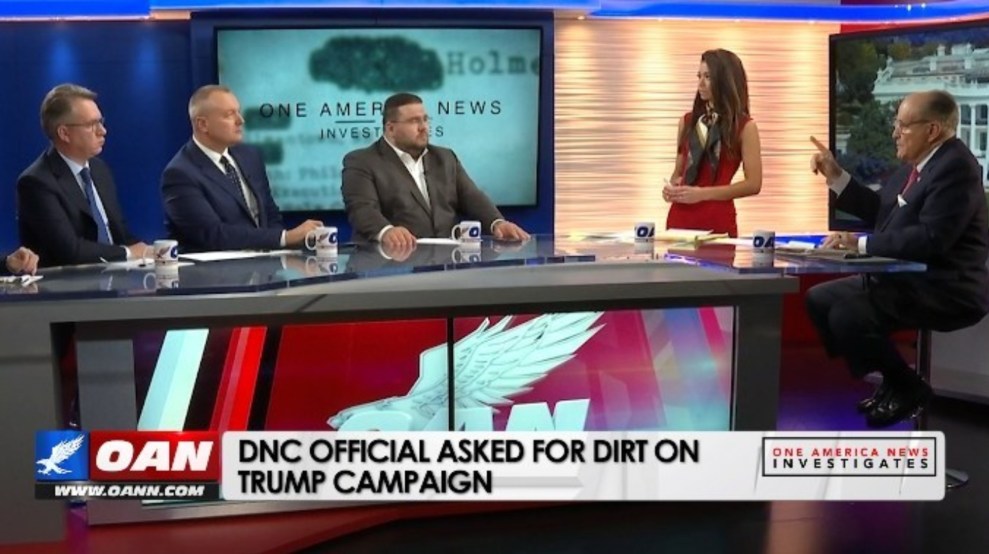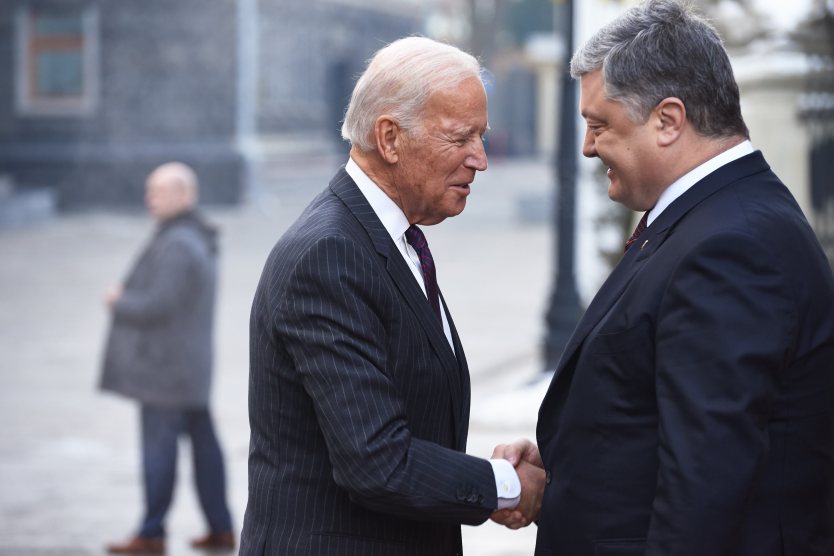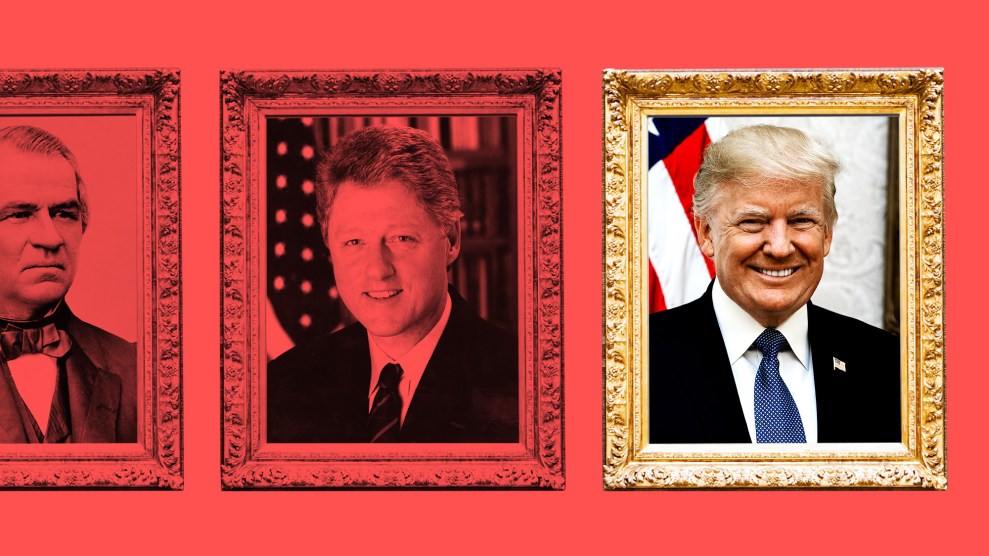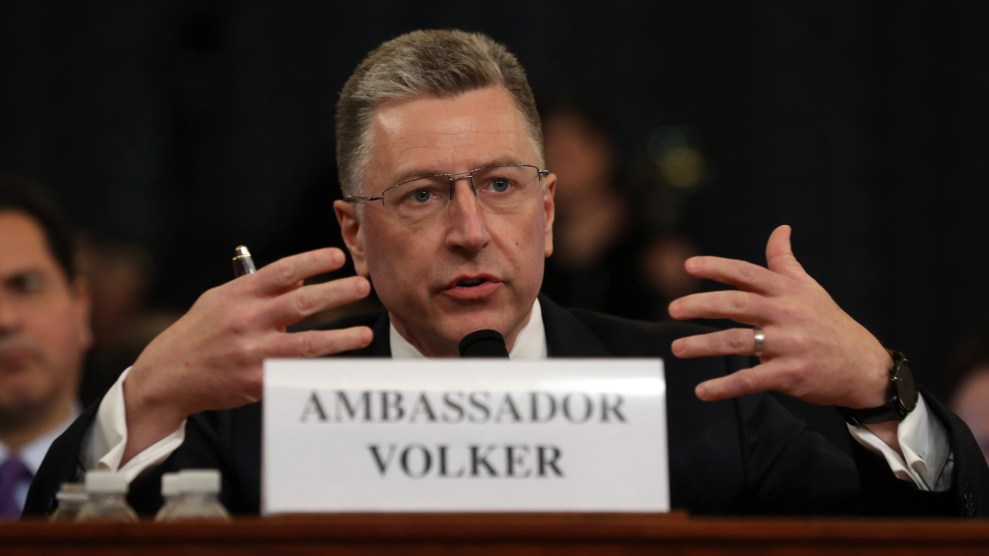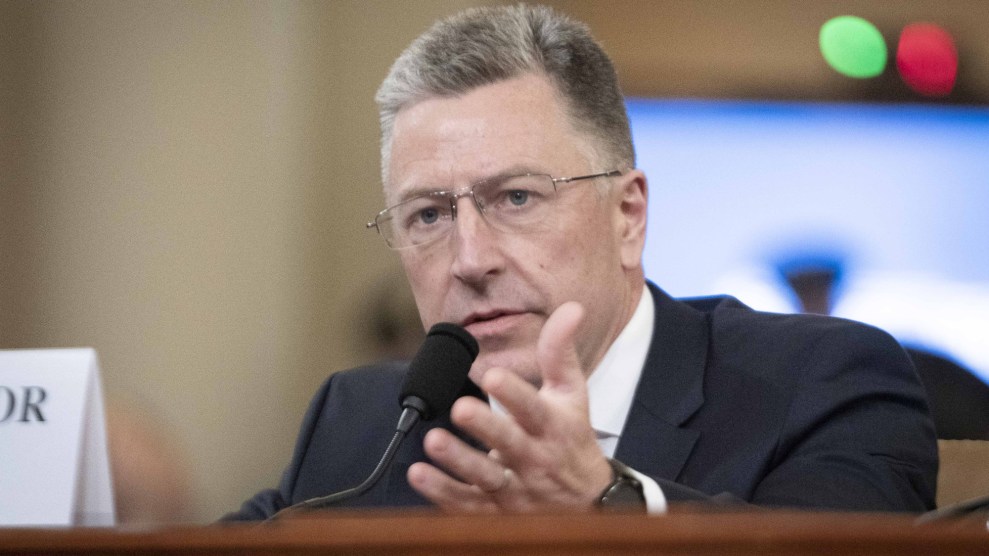
Kurt Volker testifies before the House Intelligence Committee on November 19, 2019.Douglas Christian/Zuma
The testimony of a key witness in Donald Trump’s first impeachment trial is under new scrutiny by the House Intelligence Committee following a report this week that undercuts the veracity of his claim that he was unaware of a Trump effort to pressure Ukraine into mounting a meritless investigation of Joe Biden.
On Monday, CNN reported new details of a July 2019 call between Rudy Giuliani, then–US special envoy to Ukraine Kurt Volker, and Andriy Yermak, a top aide to Ukrainian President Volodymyr Zelensky. During that call, Giuliani, then Trump’s personal lawyer, aggressively pressed Ukraine to announce investigations into dubious accusations about Biden and about alleged Ukrainian meddling in the 2016 election. Portions of this conversation have previously been reported by BuzzFeed News and Time, but CNN published the full audio of the 40-minute call. The recording of the conversation contradicts Volker’s sworn testimony to Congress that he never witnessed any attempt on the part of Trump and Giuliani to muscle Ukraine into launching an investigation of Biden, Trump’s possible opponent in the upcoming presidential election.
The discrepancy between Volker’s testimony and the recording of the call has drawn the attention of House Intelligence Committee Chairman Adam Schiff (D-Calif.), who tells Mother Jones that Volker’s assertions to Congress amounted to “a disingenuous revision of history.”
A former aide to the late Sen. John McCain (R-Ariz.) who was appointed ambassador to NATO by George W. Bush, Volker is a foreign policy establishment figure who retains posts at a prominent DC lobbying firm and a think tank. Secretary of State Rex Tillerson picked Volker as a special representative to Ukraine in 2017, a nominally part-time job that overlapped with the duties of then-US Ambassador Maria Yovanovitch, who Trump later fired.
Volker became a key figure in the Trump administration’s 2019 effort, spearheaded by Giuliani, to push Ukraine to investigate alleged corruption relating to Burisma, a Ukrainian energy company where Hunter Biden had once served as a board member. Giuliani particularly wanted Ukrainian prosecutors to announce a probe into flimsy allegations that Biden as vice president had forced the firing of a top Ukrainian prosecutor, Viktor Shokin, to derail a supposed investigation into Burisma. This pressure campaign culminated in the White House holding up almost $400 million in military aide for Ukraine and led to Trump’s first impeachment in December 2019.
Volker claimed in sworn testimony during Trump’s impeachment proceedings that, even as he helped push Ukraine to look into Burisma and corruption, he did not know that those topics related to Joe Biden—and, consequently, he was unaware that he was assisting in the Giuliani-Trump effort to smear a political rival.
“Vice President Biden was never a topic of discussion,” Volker said in an October 3, 2019 deposition before the House Intelligence Committee. He repeated that claim in televised testimony before the committee the following month: “At no time was I aware of or knowingly took part in an effort to urge Ukraine to investigate former Vice President Biden. As you know from the extensive real-time documentation I have provided, Vice President Biden was not a topic of our discussions.”
CNN’s report on that July 2019 phone call shows that Volker’s account was not true. Giuliani repeatedly urged an investigation targeting Biden during that conversation, which Volker was part of. And Giuliani said that announcing such a probe would help Zelensky improve relations with Trump.
“All we need from the President [Zelensky] is to say, I’m gonna put an honest prosecutor in charge, he’s gonna investigate and dig up the evidence, that presently exists and is there any other evidence about involvement of the 2016 election, and then the Biden thing has to be run out,” Giuliani said at one point. “Somebody in Ukraine’s gotta take that seriously.”
Giuliani also told Yermak that he was eager for Ukraine to look into an allegation that Shokin “was fired because Vice President Biden threatened [former Ukrainian President Petro] Poroshenko with not getting a [US] loan guarantee that was critical at the time.”
In his October 3 deposition, Volker acknowledged arranging and participating in this call with Giuliani and Yermak, but he insisted it was “just an introductory” conversation. “It was literally, you know, ‘let me introduce, you know, Mr. Giuliani; let me introduce Mr. Yermak. I wanted to put you in touch.'” Volker said. “Blah, blah, blah.”
In fact, the lengthy call—which reportedly shocked Ukrainian officials—included an extensive discussion of what Giuliani and Trump hoped to get out of Ukraine.
Volker’s misleading testimony mattered. Republicans including Rep. Jim Jordan (R-Ohio) and Sen. Lindsey Graham (R-S.C.), who argued successfully against the Senate convicting Trump, cited the former diplomat’s claims to defend Trump. “Volker, the special envoy, said there was no quid pro quo,” Graham told reporters in November 2019, adding: “I find the whole process to be a sham and I’m not going to legitimize it.”
In a statement to Mother Jones, Schiff, who acted as lead House Manager during Trump’s first Senate impeachment trial, argues that the information that Volker failed to disclose—Giuliani overtly pressured Yermak for a so-called quid pro quo on the July 19 call—is more evidence that Trump should have been removed from office.
“During his deposition, Ambassador Volker suggested that he did not see a connection between requests for an investigation into Burisma and one into the Bidens, except in retrospect,” Schiff says. “These tapes reveal that to be a disingenuous revision of history. At trial, we warned that more of the truth would come out over time—and it has—validating the need for President Trump’s removal and tarnishing the reputations of those who knowingly participated in his scheming.”
Almost as soon as Volker’s deposition became public, questions about its accuracy arose. Just Security wrote in November 2019 that “it appears that Mr. Volker lied to Congress in violation of federal criminal law” during his October deposition. But the new reporting on the July 19 call offers stronger evidence that Volker made false claims in his October deposition and November public testimony.
Volker declined to address questions about his sworn statements. “I have nothing to add to what was already covered in my public testimony,” he said in an email Tuesday.
Schiff did not respond to a question about whether the intelligence committee will ask the Justice Department to consider charging Volker with perjury. But a committee staffer said the panel “will continually review new information that comes to light related to the Ukraine investigation to determine the appropriate response, including whether witnesses were truthful.”
Giuliani’s efforts in Ukraine are the subject of a criminal investigation. FBI agents searched the former New York mayor’s Manhattan home and office in April, seizing various electronic devices. In an interview last week, Giuliani told Mother Jones that agents told him they suspect him of “one act of failing to register as a foreign agent” related to his interactions with Yuriy Lutsenko, a former Ukrainian prosecutor who issued and later rescinded allegations about Biden that Giuliani and Trump pushed Zelensky to investigate. Giuliani said he did not represent Lutsenko and called the investigation into his actions “completely dishonest, completely corrupt.”
Amid the Ukraine scandal, Volker in 2019 resigned his diplomatic post and also stepped down as executive director of the McCain Institute at Arizona State University. But he remains a senior international adviser and advisory board member at lobbying firm BGR Group, a role Volker held even while serving as a diplomat, and he is currently a distinguished fellow at the Center for European Policy Analysis, a think tank. Those organizations did not respond to requests for comment.

